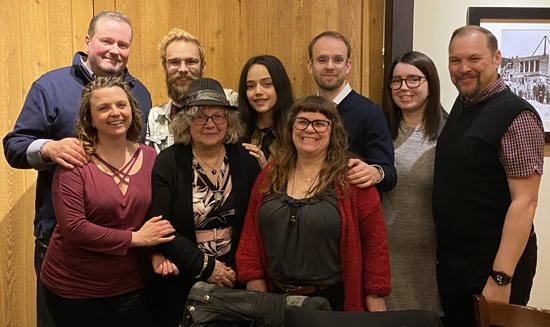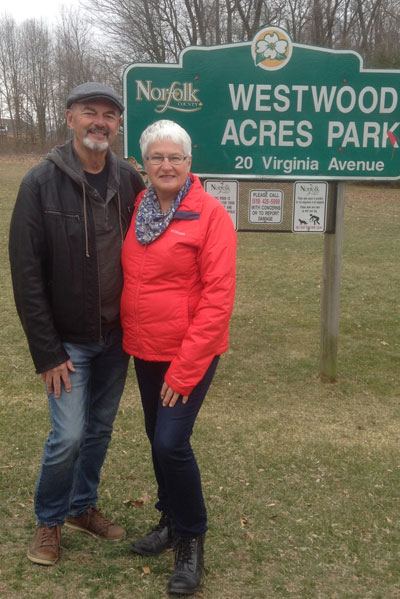Inspiring Stories From the COVID-19 Front Lines

An inspiring sign of the times. A neighbourhood in Simcoe, Ont., is doing everything it can to combat the stress and loneliness of self-isolation. Photo: Courtesy of Jane Erauw
Catching up on reading, doing long put-off chores, binge-watching favourite shows or FaceTiming with the kids and grandkids – while older Canadians may be stressed out by the disruption caused by COVID-19, they’re coming up with novel ways to adapt to the times.
Our Facebook page has been filled with stories of people whose lives have been greatly affected by the recent upheaval.
One woman posted that she was stranded in Mexico, waiting for a rescue flight home. Another described her frustration that she couldn’t get tested after returning from a cruise, despite the fact that she was sick. One exasperated poster said she is “suffering a whole new level of anxiety” because she’s not sure she’ll receive treatment for a pressing health emergency. And in a true sign of the desperate times we live in, a mother recounted how the only way her daughter (who is self-isolating in Vancouver) can get supplies is by lowering a bag from her balcony.
These shocking stories continue to pour in as Canadians try to adjust to the new normal of living under COVID-19.
But there are also signs that Canadians, especially the older generation, are making the most of a bad situation and adopting a positive attitude, even at a time when their world has been turned upside down.
Our Facebook page was filled with positive messages, including one suggesting that seniors “who have experienced a lot of bad times as well as good are better situated to handle the stresses and uncertainties that everyone is facing now.” This sentiment was echoed by another, who said: “Our grandparents fought in WWII. We are being asked to sit on the couch, we can do this.” One charitable gentleman suggested donating money people would normally spend on dining out to a worthy cause. Some were learning new skills, like baking bread, another was working on her family tree, while yet another, finding humour amid all the doom and gloom, posted: “If someone hates a few days of self-isolation, retirement is really going to be a bummer.”
Dealing With Fear, Uncertainty and Change

We interrupted Carol Sevitt, a retired professor of business communications at Ryerson University in Toronto, while she was working out to an online Zumba class. An active senior with a busy schedule, Sevitt is trying to adjust to living in self-isolation with the “fear, uncertainty and change in a world that feels like life as we know it has crumbled.” She has the added anxiety of worrying about her husband, Brian, a cardiologist at the Trillium Health Centre in Mississauga, Ont.
In an effort to “normalize” her life, Sevitt describes how she’s trying to develop a new routine. She exercises in the morning, takes a walk outside in the afternoon, cooks in the evening, enjoys a glass of wine with her husband and watches Netflix. Plus she’s keeping in regular contact with her family members, including her 97-year-old mother in Manitoba. While two of her grandsons, in Grades 5 and 7, are home from school, she’s trying to keep them busy by reading to them over FaceTime and developing educational activities.
With Passover coming up, she knows her family’s regular observance of the most important Jewish holy day will be disrupted. However, her brother has suggested using a video-conferencing app to see if they can get the whole family participating in a virtual Passover.
While she tries to keep her spirits up, the COVID-19 measures have triggered troubling associations for this child of Holocaust survivors. “When they started talking about social distancing and isolation, my thoughts immediately went to the Holocaust and the people who had to go into hiding and isolation,” she says. “But I’m trying my best to stay positive and stay busy.”
“My Wild Irish Rose”

Maureen McLeod, a 75-year-old retiree from Calgary, says the new measures have made her come to terms with her “stubborn independence.” So instead of going out shopping on her own, as she always has in the past, she recently relented and decided to abide by the new rules.
“I wrote out the shopping list, took a photo of it and texted the photo to my grandson,” says McLeod. Her grandson and his girlfriend picked up the groceries and delivered them to her door. And not only did they refuse to let McLeod pay but they also brought along a bouquet of flowers. “I would have loved to have hugged them both but, of course, we kept our social distance,” says McLeod.
As to her anxiety levels, McLeod says she’s not overcome by worry. “Still, it’s one of those things that’s always in the back of my mind.” She has cancelled her club meetings, but is keeping busy reading, walking up and down her stairs and keeping in touch with her extended Irish-Canadian family. “On St. Patrick’s Day, I was on the phone to my sister Lucille. She said, ‘Wait just a moment.’ She put the phone on her piano and played ‘My Wild Irish Rose.’ My mom’s name was Rose … it was just the sweetest thing. It’s one way we can keep in touch without touching.”
Window Shopping

Jane Erauw, 66, of Simcoe, Ont., is staving off the boredom of isolation by “cleaning out the winter mess in her backyard” and staying in contact with her son, who lives nearby, and her daughter in England.
Because everyone in her neighbourhood is following all precautions, they’ve come up with an ingenious way of keeping community spirit alive.
She and husband Mike, 69, live in a subdivision that has a Facebook community group. Recently, one of the members shared the idea of decorating their windows. For example, on St. Patrick’s Day, everyone put shamrocks out. Down the road, people will be putting out pictures of animals, funny faces, jokes, encouraging words, flowers and Easter eggs.
“It gives people a reason to get out of their houses to look at the windows. We saw families with little kids who were so excited to go from one house to the next to see the pictures.”
Not only does it engender a shared sense that we’re all in this together, but it’s an activity that can be done from a distance. “And it’s something positive,” says Erauw. “We’ve got so many negatives it’s nice to have some positives.”
Coping With Stress of Self-isolation
Staying positive, especially during a time of massive changes to our routines, is of upmost importance to keep feelings of fear and anxiety at bay, says Dr. Katy Kamkar, a clinical psychologist at the Centre for Addiction and Mental Health and an assistant professor in the department of psychiatry at the University of Toronto.
Because of the emergency measures restricting large gatherings, quarantine and self-isolation, “Everyone has noticed a drastic change in their everyday life and their everyday structural routines,” says Kamkar. “The anxiety that people are feeling, the worries and the uncertainty are very normal reactions. The key is finding a way to best manage the worries and the anxiety.”
Here are Kamkar’s tips on ways we can reduce stress levels during these difficult times.
You’re Not Alone (Although It May Feel Like You Are)
While some groups — especially seniors and those with underlying conditions – are at higher risk than others, it doesn’t mean they’re the only ones facing the threat. Whether they like to admit it or not, younger people at risk are self-isolating and limiting social interactions just like older age groups. “So yes, there’s this feeling of being isolated and being alone,” says Kamkar. “But on the other hand, everyone’s lives have been impacted. We are all in this together.”
Keep in Touch
Being in quarantine or self-isolation limits our ability to perform everyday activities like shopping, social calls, group meetings or religious services. This will inevitably result in feelings of loneliness, vulnerability and anxiety. To combat this, Kamkar urges everyone to keep in regular touch and seek support with family members and friends through calling, texting, email, FaceTime, Skype and social media. “We do not need to be close or physically see one another to be together,” she says.
Seek Balance
Keeping up-to-date with the latest developments is important but only if it doesn’t increase anxiety. “What I always say (is) everything works on a continuum, and we do need to see where we are on the continuum to set this balance,” says Kamkar. If watching the news or constantly discussing the threat of COVID-19 is starting to raise our panic levels, then we should probably change the channel or talk about something else. Kamkar reminds us to think about the good things around us, not the bad, in order to find a better balance.
Roll With the Punches
Because the COVID-19 pandemic is rapidly evolving, every day brings something entirely new and unexpected. These disruptions to our cherished routines can be another big source of anxiety. “Try to create new routines, new structure and find new positivity to create comfort in the home,” says Kamkar. “Sometimes there are projects that we always wanted to do but never had the chance because we’ve been too distracted or busy.” It might be the perfect opportunity to finally check boxes on that to-do list that we’ve been putting off. Above all, eat well, get plenty of rest and relaxation and don’t forget to exercise, even it’s walking up and down the stairs.
There’s Light at the End of the Tunnel
Remember, self-isolation measures are temporary. Like all other disease outbreaks, COVID-19 will pass, and life will return to normal. Because we don’t know when that day will come, we just have to wait it out. By following the guidelines issued by public health and practising good hygiene and social distancing, we can ensure the health care system doesn’t get overwhelmed all at once. Calm your nerves by listening to classical music or pass the time by playing online games. The best way to manage anxiety is by “focusing on the positive that we have around us right now,” says Kamkar.
RELATED:
COVID-19 Sparks Ugly Social Media Backlash Against Older Generations
COVID-19: Beat the Isolation Blues With Virtual Concerts, Operas, Museum Tours and More